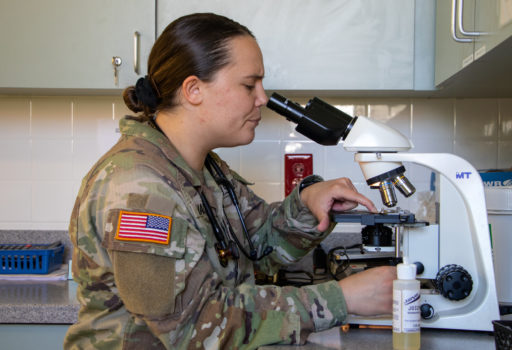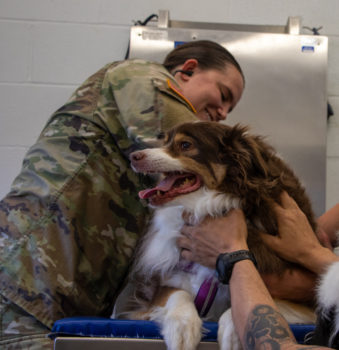FORT KNOX, Ky. – For U.S. Army Capt. Sarah Bohac and Sgt. Jason Stokes, when choosing their careers, veterinary medicine came first. Stokes’ parents served in the Army; Bohac’s parents served in the Air Force. Both wanted to follow their passion for animal medicine and serve in the military.

“I was a typical ‘I want to be a veterinarian’ [child] since I was three years old,” said Bohac, the officer in charge of the Fort Knox Veterinary Treatments Facility. “I just didn’t realize I could be a veterinarian in the military until I was in vet school.”
One day, Bohac got a random email telling her that she could practice animal medicine with the U.S. Army. She researched to see if she could go into the Air Force like her parents, but the Army is the only military branch where veterinarians practice medicine. While the Air Force healthcare career fields include nursing, public health, and administration, the Army healthcare career fields allow veterinarians to practice animal medicine.
Stokes started working in veterinary medicine 17 years ago when he was 15 years old. In 2010, Stokes considered choosing multiple military occupational specialties. His parents both went into aviation.

“Originally, one of the jobs I signed up to do was aviation, but then, my mom pointed out their 68T [animal care specialist],” said Stokes. “I was already working in animal medicine, so I was like ‘alright, I will throw my name in the hat.’”
Stokes ultimately received the animal care specialist position as his MOS and has remained in this occupation ever since. Some of the responsibilities for animal care specialists include caring for military working dogs, preventing and controlling the spread of diseases from animals to humans, and working with veterinarians to conduct routine exams and administer medications.
“I’ve heard so many times where people don’t even know we exist,” said Bohac. For those interested in the veterinarian career field, the U.S. Army Veterinary Corps website offers a roadmap to do just that.




